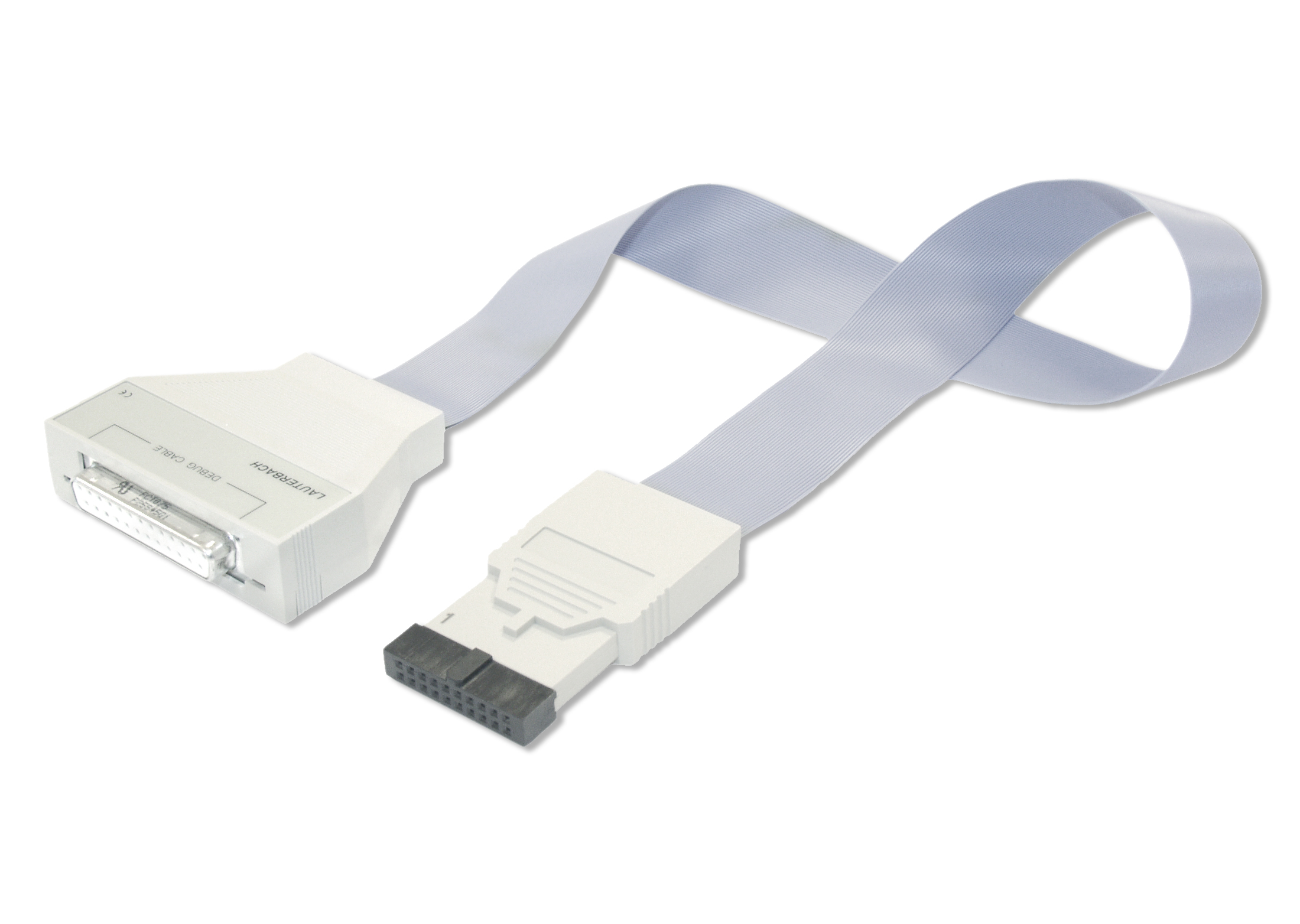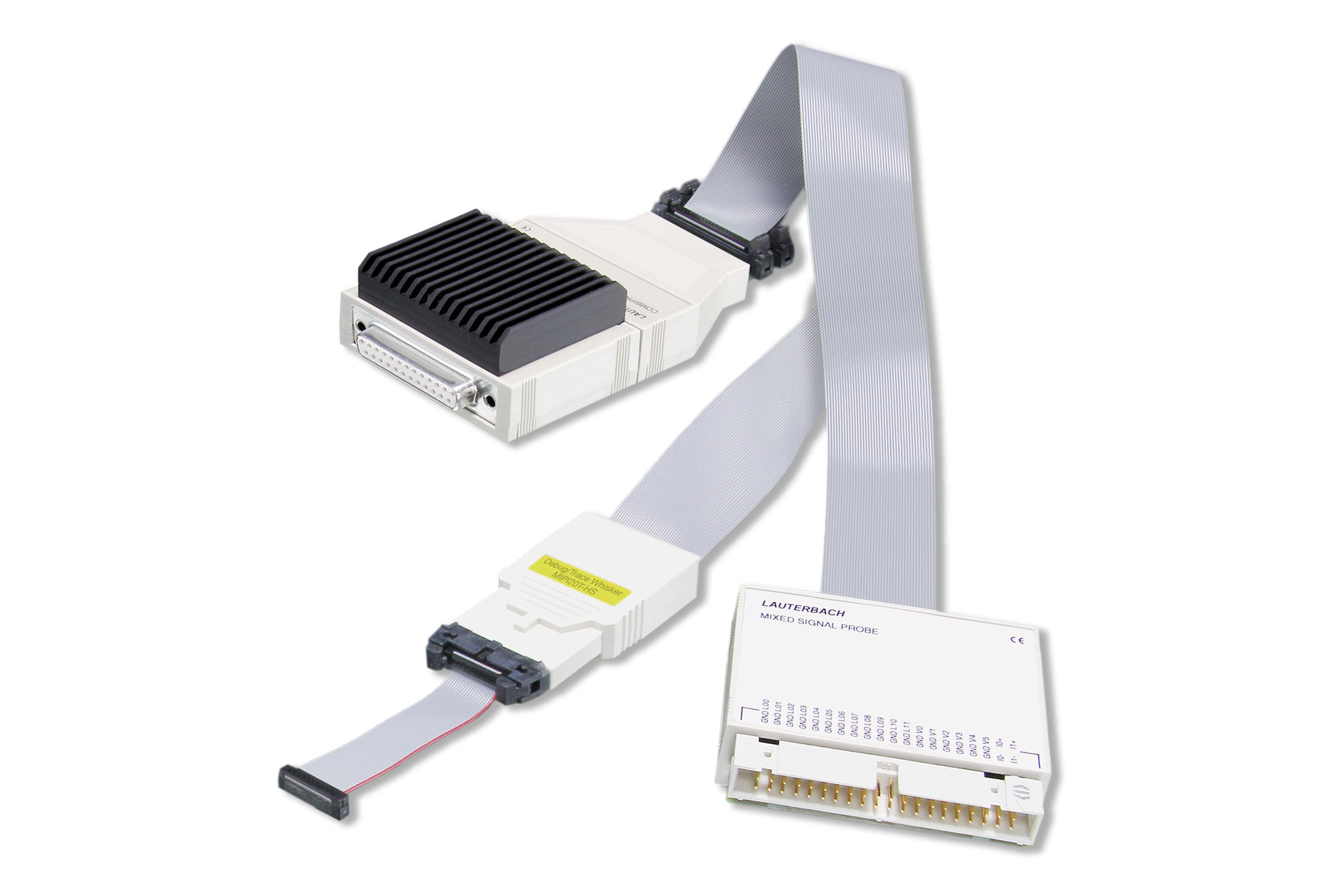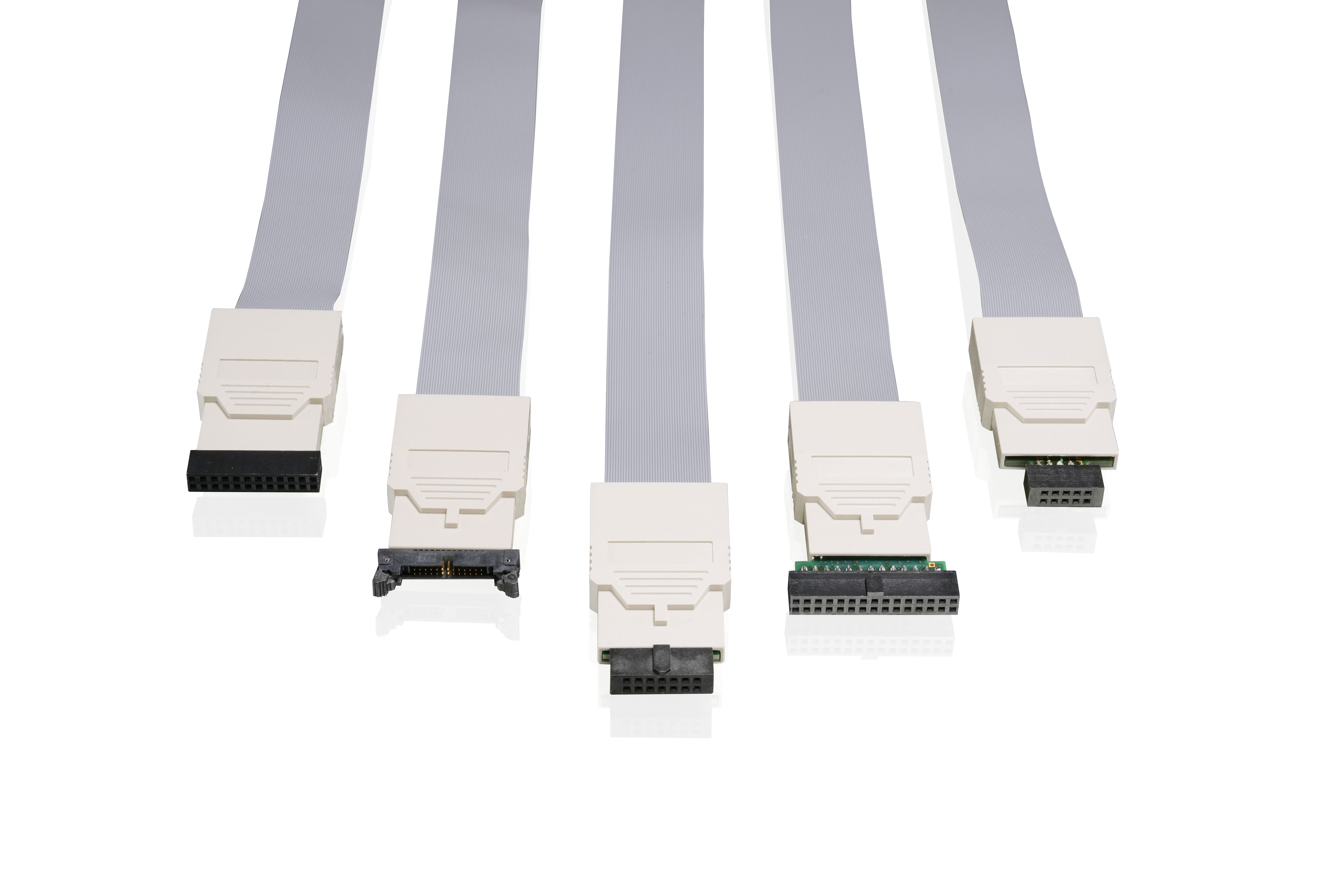AUTO26 Debug Probe
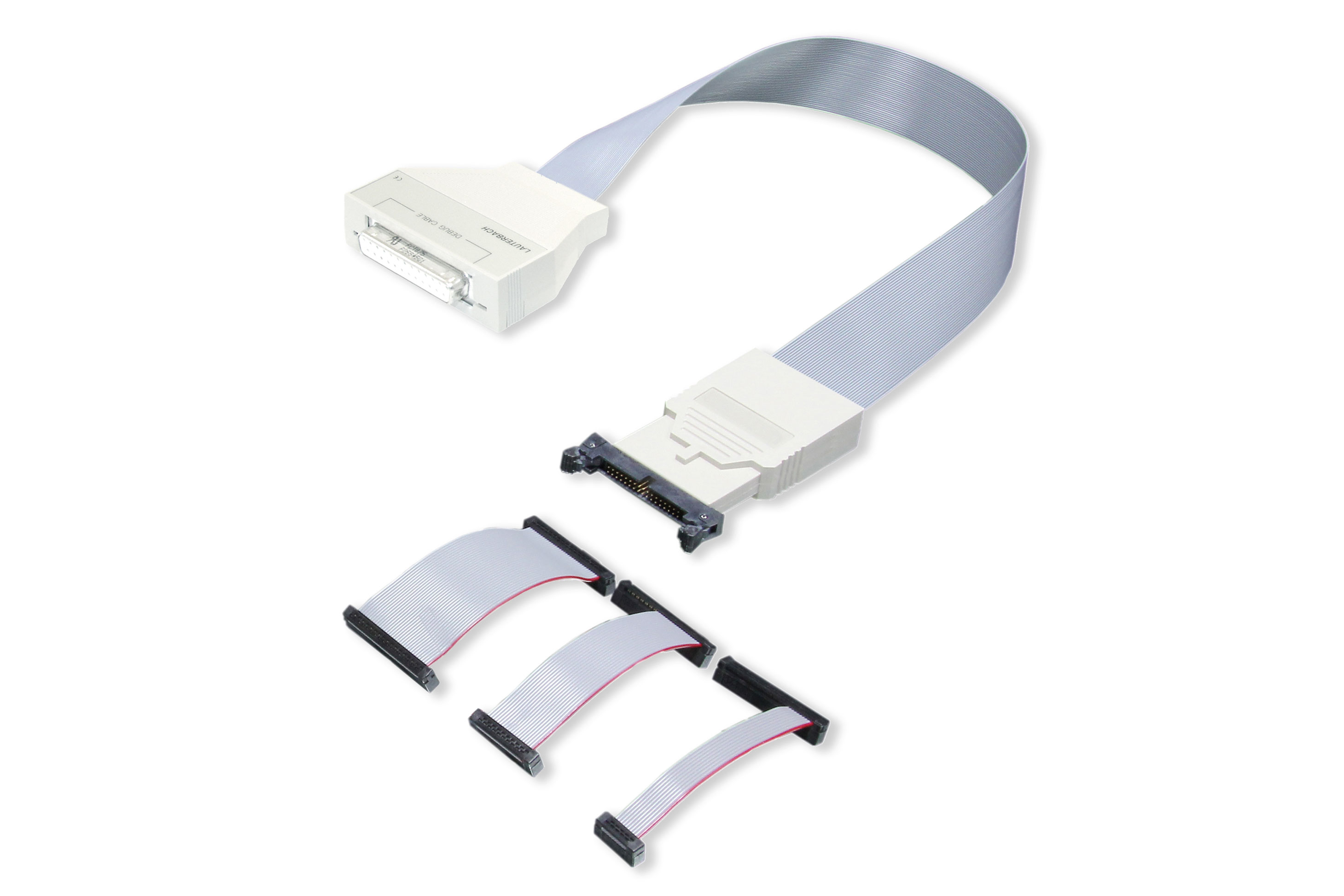
Excellence for Automotive Projects
The AUTO26 Debug Probe was designed specifically for the use in automotive projects. Thanks to its state-of-the-art FPGA technology it can support a wide range of processor architectures and debug protocols with unprecedented performance. Furthermore, it offers additional control signals that are widely used in the automotive market.
With three different target connectors supplied as standard (10, 20 and 26 pin-count), it offers flexibility regarding the available number of pins on the target and the required functionality. The 10-pin version of the target connector is compatible with the MIPI standard. Additional adapters are available to connect the AUTO26 Debug Probe to targets with any kind of debug connector.
Unique Debug Support for the Automotive Industry
The AUTO26 Debug Probe is the result of many years of experience in the automotive market. The wide range of supported architectures and its support of automotive requirements make it unique in the embedded industry.
One debug probe for all major automotive architectures
This debug probe implements the AUTO26 pin-out, which was designed by Lauterbach to have a common interface for all kinds of automotive control units. You no longer need separate debug probes for different automotive architectures.
Flexible choice of target connector size
The standard supplied flex-cables for 10-, 20-, and 26 pins enable you to map your functionality requirements to the most space and cost saving pin-out on your target. Additional converters are available to support many more types of automotive debug connectors.
High transfer speed and signal stability
With an active circuit target connector, the AUTO26 Debug Probe provides highest signal stability at highest transfer speeds. For appropriate processors the high throughput performance even allows some real time tracing.
Extended debug signals for important use cases
Besides the usual debug signals for JTAG, SWD or DAP, the AUTO26 Debug Probe provides additional signals to handle special automotive use cases, such as debugging and tracing through power cycles and sharing the debug port with calibration tools and others.
More details belowWide voltage range
In order to support every automotive project, the AUTO26 debug probe supports up to 5V on all input and output pins.
Optional galvanic isolation
For the AUTO26 Debug Probe, Lauterbach offers a Galvanic Isolation Adapter. It galvanically isolates the PowerDebug base module from the AUTO26 Debug Probe, providing full debug performance while isolating from the floating potential of the device under test. This adapter is the perfect solution for embedded projects in electric vehicles.
Universal Debug Protocol Support
JTAG (IEEE 1149.1)
JTAG is the debug protocol commonly available with most CPUs. Derived from Boundary Scan device testing, JTAG allows an external tool to communicate with a Test Access Point (TAP) controller inside a chip. A TAP is the access point to the debug infrastructure within a chip. TAPs can be chained to allow the debug-ging of several cores via a single debug probe.
cJTAG (IEEE 1149.7)
Compact JTAG (cJTAG) is a technology based on JTAG which reduces the pin count of the debug interface by serializing the JTAG communication between the debugger and the core’s Test Access Points (TAPs). Multiple chips can be supported in a star topology. Compared to normal JTAG, it saves costs for physical pins with a slightly reduced debug performance.
SWD/SWO
SWD (Serial Wire Debug) is a 2-pin debug interface defined by Arm®, which is optimized to access the CoreSight™ debug infrastructure with maximum performance. Serial Wire Output (SWO) is an optional extension pin to SWD. If a processor has an SWO pin, the AUTO26 Debug Probe is able to receive trace data from both code instrumentation and data accesses*.
*Supported by PowerDebug E40/PowerDebug Pro and newer base modules
Infineon DAP
The Infineon Device Access Port (DAP) is a versatile debug interface with two or more pins. Its CRC6 protection makes it robust for noisy environments. It supports much higher frequencies than JTAG and it allows transmitting real time trace data with low- to medium bandwidth.
Spitfire
SPITFIRE™ is a serial protocol based on SPI used to debug Microchip dsPIC® processors via two wires. The AUTO26 debug probe supports also the ICSP protocol to program the flash memory of a dsPIC®.
Renesas LPD / UART Mode
Low pin debug (LPD) mode is a Renesas specific debug protocol. It is available as LPD4 (4-pin) and LPD1 (1-pin). LPD4 mode also supports low bandwidth and software traces (SFT). For serial flash programming, the Renesas debug protocol further supports asynchronous and synchronous interface modes (UART / CSI).
Get Control of Any Automotive Controller
The AUTO26 Debug Probe was designed to support a wide range of chips typically used in the automotive sector, from simple microcontrollers to the most complex SoCs, from today's established microarchitectures to trendy new architectures and various sub-controllers. Supported architectures are:
| Architecture | Protocol |
| Arm | JTAG, cJTAG, SWD, SWO |
| PowerPC MPC5xxx/SPC5 |
JTAG, cTJAG |
| RH850 | JTAG, LPD/UART |
| TriCore | JTAG, Infineon DAP |
| XC800 |
JTAG, Infineon DAP |
| Xtensa |
JTAG, cJTAG, SWD |
| ARC |
JTAG, cJTAG, SWD,
Infineon DAP |
| RISC-V |
JTAG, cJTAG, SWD |
| dsPIC | Spitfire |
| GTM |
JTAG, cJTAG, SWD, Infineon DAP,
LPD/UART |
| eTPU |
JTAG, cJTAG, SWD |
| SPT |
JTAG, cJTAG, SWD |
Best Control over Your Automotive Target
The AUTO26 debug probe is the result of Lauterbach’s 30+ years of experience in supporting automotive applications. It supports additional signals that fulfill special needs in automotive applications. This functionality is not supported by conventional debug probes.
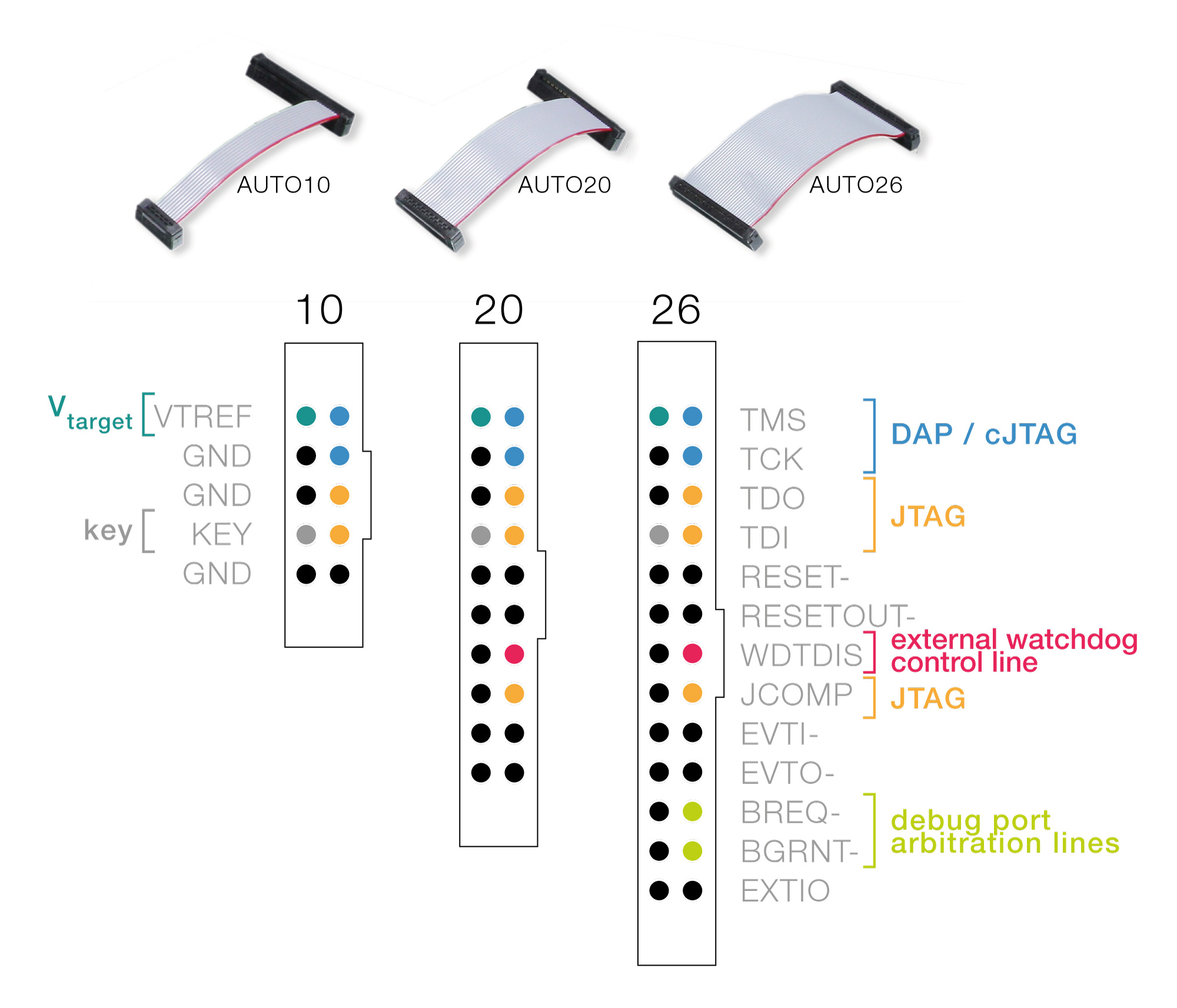
Watchdog disable
The watchdog disable pin allows to debug targets that are equipped with a hardware watchdog timer, without modification of the target board. It can permanently disable the watchdog as well as control the watchdog based on the core state.
Second reset pin
Some chips have several reset pins, for example dedicated reset-in and reset-out pins. With the second reset pin, the debugger is able to fully monitor the processor’s reset states. This enables features like debugging through reset.
Dedicated pins for debug port arbitration
In automotive applications, the debug port is often shared between debugger and third-party tools like calibration and prototyping tools. The debug port arbitration pins allow to share the debug port with these tools. Having dedicated pins means that debug port arbitration is possible without repurposing other pins and thus keep their original functionality.
Trigger pins (1 in / 1 out)
The trigger pins are used to send external events to the SoC or to propagate SoC events to other tools like oscilloscopes.
Technical Information for the AUTO26 Debug Probe
| Voltage Range | From 1.8V to 5.0V |
|---|---|
| Debug Clock Frequency | From 10 kHz to 160 MHz |
Get the AUTO26 Probe for Your Architecture
Supports TriCore, PCP and GTM debugging included. Supports JTAG, DAP, DXCPL, DXCM. Supports DAP streaming under certain conditions (see below). Includes the TRACE32 software for Windows, Linux and macOS on DVD and for download. Requires PowerDebug debug base module from 2004 and newer. (Works with all PowerDebug except Gen 1 (LA-7702 & LA-7704).) Requires LA-3849 if 16 pin JTAG (TriCore) connector is used. DAP Streaming is supported if you use the device with a PowerDebug PRO, E40, or X50 and your PowerView software is version R.2023.09 or newer (build 160619 or higher). If these requirements are met, DAP Streaming is possible only in DAP mode (DAP2, DAP3, DAPWide, DAP4). For performance reasons, we recommend DAPWide at 160 MHz (for a transfer rate of 320 Mbit/s). Trace display and analysis (based on DAP streaming, onchip-buffers, or a PowerTrace) requires LA-3799X (Trace License for TriCore ED). For DXCPL/DXCM you will probably also need the CAN-Box (LA-3889).
Supports RH850 via JTAG, LPD4, LPD1 (included ICU-M core). Supports V850 via NWIRE. Includes software for Windows, Linux and macOS. Requires PowerDebug debug base module from 2004 and newer. (Works with all PowerDebug except Gen 1 (LA-7702 & LA-7704).) Includes Debug Cable with 26 pin connector (1.8V to 5.0V). Includes Converter AUTO26 to JTAG14 (LA-2700).
Debug Cable with debug license to debug Qorivva MPC5xxx/SPC5xxx (e200 cores) and Freescale PX SERIES processors. Includes Debug License for eTPU, GTM and SPT. Includes AUTO26 Debug Cable with 26 pin connector (1.8V to 5.0V). Includes a converter AUTO26 to JTAG14 OnCE (LA-3873) Includes TRACE32 software for Windows, Linux and macOS on DVD or via download. Requires mulcitore license LA-7960X for concurrent debugging of multiple e200 cores on multicore processors. (not necessary for lockstep mode). Requires one of the following PowerDebug base modules: PowerDebug X-Series, PowerDebug E-Series, PowerDebug PRO, PowerDebug Interface USB 2/USB 3, PowerDebug II, PowerDebug Ethernet, PowerTrace Ethernet.
Debug Cable with debug license to debug dsPIC single-core controller from Microchip. Supports dsPIC33A, dsPIC33C, and dsPIC33E. To debug dual-core dsPICs order instead: LA-3084 Package for CombiProbe 2 dsPIC Dual Core. Includes Debug Cable with 26 pin connector (1.8V to 5.0V). Includes Converter to MICROCHIP-8 header. Includes TRACE32 software for Windows, Linux and macOS on DVD or via download. Requires one of the following PowerDebug base modules: PowerDebug X-Series, PowerDebug E-Series, PowerDebug PRO, PowerDebug Interface USB 2/USB 3, PowerDebug II, PowerDebug Ethernet, PowerTrace Ethernet.
Connect to Every Target
There are many different connectors used in automotive applications. We do have a wide range of converters to adapt to the corresponding connector used.
Converter from Automotive Debug Cable (26-pin) to Mictor 38pin (NEXUS MPC5XXX pinout) for LA-2708 (Debugger for MPC5xxx Automotive PRO) LA-3206 Debugger for MPC5xxx AUTO26 (PACK) LA-3736 (JTAG Debugger for MPC5xxx Automotive)
Converter from Automotive Debug Cable (26-pin) to Samtec 50pin (NEXUS MPC5XXX pinout) for LA-2708 (Debugger for MPC5xxx Automotive PRO) LA-3206 Debugger for MPC5xxx AUTO26 (PACK) LA-3736 (JTAG Debugger for MPC5xxx Automotive)
Converter from AUTO26 pin-out to MICROCHIP-8 headers for debugging dsPIC controllers from Microchip. Can be used with AUTO26 debug cable or AUTO26 debug whisker.
Converter from Automotive Debug Cable (26-pin) to 14 Pin RH850 connector on target for LA-2709 Debugger for RH850/V850 Automotive PRO LA-3205 Debugger for RH850/V850 AUTO26 (PACK) LA-3739 Debugger for RH850 Automotive
Looking For Other Debug Probes
If the AUTO26 is not the right solution for you, we offer a manyfold of other debug probes.
Any Questions?
With over 4 decades of industry leadership, our expert engineers are on-hand to help you. If you want advice about our products or which configuration is best for you, please contact our Sales Engineers. If you want help with your Lauterbach system, please contact our Engineering Support Team.









